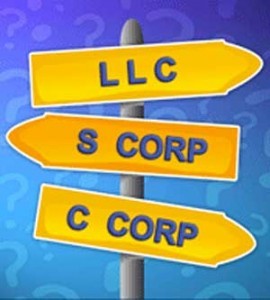 Having made the decision to incorporate, a business owner is then faced with the next decision: should the business form be a traditional corporation or a limited liability company? These forms each offer the owners limited liability in most circumstances, so does it really matter which form is chosen? As there are pluses and minuses to both forms, there is no simple answer.
Having made the decision to incorporate, a business owner is then faced with the next decision: should the business form be a traditional corporation or a limited liability company? These forms each offer the owners limited liability in most circumstances, so does it really matter which form is chosen? As there are pluses and minuses to both forms, there is no simple answer.
For example, one stock response to this question is that the LLC is better because it provides more flexibility. By flexibility, what is generally meant is that with an LLC, the founding owners can designate, through the LLC’s operating agreement, how the profits of the company will be distributed amongst them — irrespective of their ownership percentage in the company. In a corporation, profits, in the form of dividends, must be distributed amongst the shareholders in accordance with their respective percentage share ownerships. While the above “flexibility” offered by the LLC may seem like a huge advantage, small corporations do have flexibility in the way in which cash is distributed in the form of salaries and bonuses — so long as they are reasonable — and the issuance of additional shares. Moreover, at the outset, founders of corporations can have their share ownerships reflect the proportion in which they wish to distribute profits and can also have in place shareholder agreements that provide for the transfer for shares between them. Moreover, the perceived flexibility of the LLC is not relevant if there is only one owner in the enterprise, which is often the case.
Another stated advantage of the LLC over the corporation is the supposed relative ease and lower cost in forming the LLC. In most states the formation of a corporation involves a fairly simple filing with the state and, in New York such filing is relatively inexpensive. On the other hand, the New York Limited Liability Company Law requires newly formed limited liability companies publish their formation in certain approved daily news papers, which can be costly. Also, the members of an LLC are required to adopt a written Operating Agreement under Section 417 of the Limited Liability Company Law, which if drafter properly and not simply purchased as an internet template, can involve significant attorney time. The New York Limited Liability Company Law is not clear as to the consequences of failing to adopt such an operating agreement, but such failure can lead to problems if issues arise among the owners about how the company is being operated or how profits are being distributed and can be catastrophic should such issues result in litigation. Corporations, on the other hand, generally have as their initial operating document a set of by-laws that are fairly standard and do not generally require much customization.
Another factor often given in favor of the LLC is that it is does not pay federal taxes whereas corporations do. While this is may be true for large corporations, small corporations can make a Subchapter S designation with the IRS and obtain the same federal tax pass through status as the LLC. Most states also recognize thus designation, but many localities do not, including New York City which subjects both LLCs and Subchapter S corporations to city taxes. As to the taxation of cash paid to owners, the IRS considers non-passive LLC members as self-employed and, as such, LLC owners who are actively involved in the day-to -day operations of the LLC’s business must pay self-employment taxes on such payments. Shareholders who are employed by an S corporation may be paid reasonable salary, for which payroll taxes are due, and anything above that may be paid as profits for which no payroll tax is due.
One other benefit of the corporation over the LLC is that, because corporations have been around much longer than LLCs, the law relating to corporations is far more developed and, as such, is far clearer in many situations. Such clarity is clearly advantageous, for example, were there are disputes amongst owners as to how the company is being be operated or where a majority owner takes actions that benefit himself to the detriment of the company. In fact, until fairly recently, there was case law in New York stating that, because the limited liability Law did not specifically provide for it, a member of an LLC could not bring a derivative action on behalf of the company against a majority member for such bad acts.
Accordingly, the notion that the LLC is a better corporate form than the traditional corporation may not be so clear. In many cases it is not — it all depends on the particulars of the owners’ situation.
THIS BLOG IS FOR INFORMATIONAL PURPOSES AND IS NOT INTENDED TO BE LEGAL OR TAX ADVICE. CONSULT YOUR ATTORNEY AND TAX ADVISOR
Write a comment: